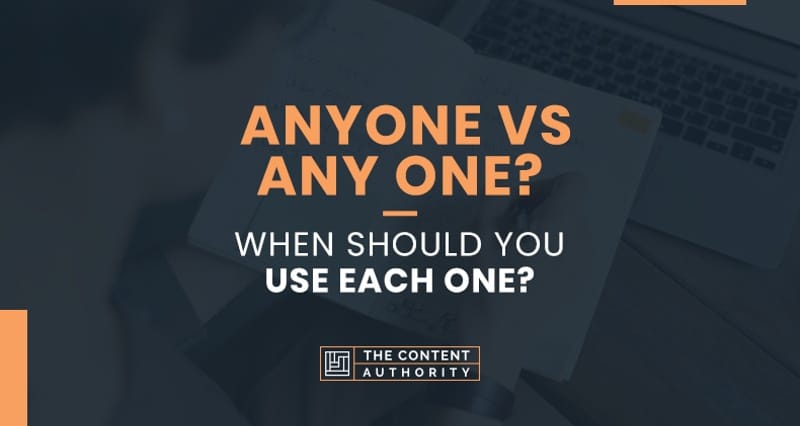Have you ever been confused by similar English words? If yes, then two words that must be top of your list are “anyone” and “any one.” When should you use each one? We bet that this is something that you want answers to.
“Anyone” is an indefinite pronoun that refers to any person without referring to a specific person. On the other hand, “any one” represents an adjectival phrase that specifies a specific member of a group of things or people. In turn, you will mostly use the “any one” variety with the preposition of.
Still, there is more to this distinction occasioned by a space between the words. Is there any situation where you can use the words interchangeably and be right? These are valid questions that are most likely popping up. In this article, we will answer all this.

When Should Use “Anyone” in a Sentence?
The word “anyone’ is an indefinite pronoun. In turn, as you can guess, it applies to an indefinite number of people. Well, this should not be far-fetched as we already mentioned that “anyone” is an indefinite pronoun.
Precisely, this is one thing that differentiates indefinite pronouns from other types of pronouns. They concern an unspecified number of things or persons. They are vague, and you cannot place a number to them.
So, when you say “anyone,” we get you are referring to people. However, there is no saying the number of persons you are referring to. Similarly, when you address a group of people using the word “anyone”, there is no limit or method to know the number of people you’re addressing.
In turn, with “anyone,” you are also talking about any person and anybody. So, it is a word that is free of any form of qualification. It can affect anyone and everyone, thanks to the absence of a distinguishing factor.
See the examples below for more understanding.
- Did anyone find the document the managing partner asked for yesterday? The senior associate looking to move up the ladder asked.
(Here, there is no limit to the persons the senior associate is addressing at the moment. He might well be addressing everyone that exists. In turn, it is irrelevant who finds the document. All he is concerned about is to ensure that they can locate the document.)
- I need anyone who can get the job done to step up this very moment; we do not have any more time to spare.
(Here, the speaker is addressing no person in specific. Instead, all he is concerned about is that someone steps up. He has no one in mind that he directs his address.
- Can anyone tell me what is the best relic in Holland’s museum? I plan on going there at the end of the year for my holiday.
(Once again, there is no focus on any one person. Instead, the speaker has thrown his request out to the general public. Now, imagine a situation where he puts it on the internet. He is inviting anyone and everyone to comment without any restriction.)
- Can anyone explain the linear approach to problem-solving that we discussed earlier? I believe you should have all read up on it.
(In this instance, the teacher or speaker is requesting an explanation on something they had earlier discussed. Here there is no restriction to the person that can volunteer to answer the question.)
So, that is the drill. You are to use the word “anyone” when you are not addressing anyone in particular. So, if you plan to address people without focusing on a specific individual, then your choice of the word will be “anyone.”
When Should Use “Any One” in a Sentence?

Now, when it comes to the word “any one,” it is an adjectival phrase. In turn, it refers to a single member of a group. Precisely, there is a reference to one thing or a specific individual.
In turn, you should use this variety when you want to address a specific member of a group. Alternatively, in this instance, you want your readers to know that you refer to one thing rather than an indefinite number of things.
See the examples below for more understanding.
- When I was at the national museum in Holland, I found it impossible to choose any one of the relics as my favorite.
(Here, the speaker has established that he could not pick a single relic as his favorite. From this, we can easily tell that he intends to pick a specific relic as his favorite.)
- I have got to say, Mr. Shelby is a cultured man; not once did he raise his hand to any one of his wards.
(Here, the speaker is commending Mr. Shelby for his discipline. Now, this commendation rests on the fact that Mr. Shelby has never spanked or hit any of his children. Precisely, not even a single one of his children.)
- The reality is that any one of those you consider your friends can become your enemy in some conditions.
(Here, you can also notice that the focus is specific to any single member of the group of friends rather than a mere generalization.)
- While any one of the car’s stock settings can get you through a wide variety of variations, the impressive thing about the vehicle is that you can still tweak it to your taste.
(As you can see, the statement conveys that a single stock setting can actually satisfy your needs. The focus here is one thing.)
From the preceding, the moment we shift our focus to the specific, the appropriate word to use will be “any one.”
Now that we have cleared up, we will provide one extra example. This example combines the use of both words. This way, you can gain better insight into their use.
- It sure does not appear like anyone here saw the movie that was showing earlier. Or am I wrong and did any one of you, in fact, see the play?
(Now, in the first sentence, the speaker has made a general comment. The speaker is unsure if anyone saw the movie. In this case, he does not have any person in mind. Precisely, he is just trying to clarify the number of people who saw the movie, which remains impossible to determine.
However, in the second statement, there is a change of focus. The speaker is now concerned about whether at least one person saw it. He is now addressing a specific group.
Also, notice the use of the preposition “of” before the word “you.” This shows that he is trying to elicit a single response from one person within the group. In turn, there is even the possibility that the speaker wants that individual to provide a summary of the movie.)
Understanding the Difference
So far, one thing is clear; if you refer to a specific person or thing, then your choice of words will be “any one.” On the other hand, if you are not specific and refer to an indeterminable group, then the use of “anyone” is appropriate.
While this is clear, you might just have some issues remembering the difference between both words. After all, they have the same spelling apart from the space between them.
So, how best can you remember this difference? Well, we have got some tips for you.
When it comes to “anyone,” if you are trying to refer to something that is indefinite, you will write it as one word. So, it is a simple, one-word variety for multiple references.
On the other hand, “any one” comes as two words when you write it. If you want to refer to a specific or singular thing, use the one that you write as two words. So, it is simple. You apply the two words option to describe singular things. Great right?
Yes, remember that you can never use both words in place of the other. They mean different things, are distinct naturally, and cannot perform the same function within a sentence. So, do not let that confuse you. They are entirely different, with no middle ground for interchangeable use.
Final Thoughts

Without any doubt, the correct usage of certain English words will not come easy to some of us. That is why it is important to learn the difference and uses of these words. Particularly, words that their pronunciation is virtually the same but their usage can leave you confused.
After reading this we know you will not be confused anymore about these two words. We have put in the work, the details to remember, we have explained the various rules guiding the usage of both words in this article for you. In turn, you can know when to use each of the words in a sentence. We have also shown you how to differentiate them easily.
So, read up and study this if you must. Afterward, you can be sure to write correctly next time you have to use both words.
Shawn Manaher is the founder and CEO of The Content Authority. He’s one part content manager, one part writing ninja organizer, and two parts leader of top content creators. You don’t even want to know what he calls pancakes.

